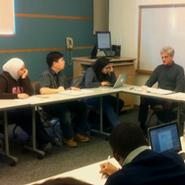
Walter L. Cronkite IV ’11 is among students in a government class being taught this semester at Hamilton by Edward S. Walker Jr. ’62, the former United States Ambassador to Egypt, Israel, and the UAE. Here he describes how Walker has used the current crisis in Egypt to teach the class about diplomacy.
Participating in an intimate, upper-level seminar about diplomacy taught by a renowned and accomplished ambassador has been a once in a lifetime opportunity for 22 students in Edward S. Walker Jr.’s ’62 government class. It has been especially fortuitous that this Egyptian crisis, which might turn out to change the entire face of the Middle-East, occurred while we are under his tutelage.
In addition to analyzing the Egypt crisis for media outlets such as The Wall Street Journal, CBS News, CNN, and NPR, visiting Hamilton professor Walker has used the crisis as a case study for his discussion-based seminar “The Tools of Diplomacy.”
Walker, the former United States Ambassador to Egypt, Israel, and the UAE, spent three hours on the second day of protests, January 26, explaining to the class the power dynamics at work in Egypt. He presciently explained that the Egyptian military was both the most powerful and most respected institution in the country and that they held the cards. Walker also taught the class about the underlying reasons for the protests, including widespread government corruption, repression, vast wealth disparity, and inspiration from the successful protests in Tunisia.
On February 9, the 16th day of the crisis, Walker led the class in an analysis of how the U.S. government could better handle the situation. Walker told the class that he believed there has been a lack of cohesion within the government on how to deal with Egyptian crisis, and that the United States is far too often inconsistent in its foreign policy. The class then separated into small groups to examine how the Egyptian dissident leaders should respond to Vice President Omar Suleiman’s speech offering concessions to the protestors.
Most groups decided that the concessions offered were too vague and left too many ways in which the Mubarak regime could retain the status quo. Walker then led discussion about possible outcomes of the crisis, and what the outcomes would mean for U.S. foreign policy. He does not believe, for example, that the Egyptian people would democratically elect the Muslim Brotherhood to power.
During class discussions, Ambassador Walker has drawn from his vast experiences, including his personal impressions of President Hosni Mubarak (a wily old fox who has held onto power for 30 years in a tough environment), Vice President Suleiman (a very impressive character who is close with the CIA, is very easy for the U.S. to work with, and, though brutal, gets things done), and the leaders of the Egyptian Military (they all owe their positions to Mubarak, but their loyalty is to the Egyptian military as an institution, and their primary goal is to protect the military’s status and prerogatives). Ambassador Walker also has expounded on Egypt’s importance to the United States; because of the Suez Canal, Egypt’s peace treaty with Israel, and close co-operation with the U.S. in counter-terrorism.
